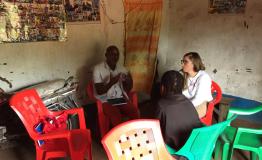

HIV/AIDS
The human immunodeficiency virus (HIV) is transmitted through blood and body fluids and gradually breaks down the immune system – over up to 10 years or more – leading to acquired immunodeficiency syndrome, or AIDS. As immunodeficiency progresses, people begin to suffer from opportunistic infections. The most common opportunistic infection that (often) leads to death is tuberculosis (TB).
Simple blood tests can confirm HIV status, but many people live for years without symptoms and may not know they have been infected with HIV. Combinations of drugs known as antiretrovirals (ARVs) help combat the virus and enable people to live longer, healthier lives without their immune systems deteriorating rapidly. ARVs also significantly reduce the likelihood of the virus being transmitted.
As well as treatment, MSF’s comprehensive HIV/AIDS programmes generally include health promotion and awareness activities, condom distribution, HIV testing, counselling and prevention of mother-to-child transmission (PMTCT) services. PMTCT involves the administration of ARV treatment to the mother during and after pregnancy, labour and breastfeeding, and to the infant just after birth.
About HIV/AIDS
Sexual activities and the exchange of body fluids are the most common causes for the spread of HIV.
It can also be transmitted through childbirth, breastfeeding and sharing needles.
While some people may develop symptoms similar to flu within the first two to six weeks of catching the virus, others may not show signs for many years while the virus slowly replicates.
Once the initial flu-like symptoms disappear, HIV will not show any further symptoms for many years.
Despite the availability of affordable rapid tests for HIV, knowledge of HIV status remains low in sub-Saharan Africa, where HIV prevalence is highest.
An estimated 60 per cent of people living with HIV are unaware of their status, and in some settings, this figure is far lower; a study in Kenya in 2009, for example, found that only 16 per cent of HIV-infected adults knew that they were infected.
There is no cure for HIV/AIDS, although treatments are much more successful than they used to be. A combination of drugs, known as antiretrovirals (ARVs), help combat the virus and enable people to live longer, healthier lives without their immune system rapidly declining.
MSF HIV/AIDS programmes offer HIV testing with pre- and post-test counselling, treatment and prevention of opportunistic infections, prevention of mother-to-child transmission and provision of ARVs for people in the late stages of the disease.
Our programmes also generally include support to prevention, education and awareness activities to help people understand how to prevent the spread of the virus.


Reaching young people with Khetha, a digital HIV counselling platform
![Lita arriving at Nsanje District Hospital. [Photo: Isabel Corthier/MSF] Lita arriving at Nsanje District Hospital. [Photo: Isabel Corthier/MSF]](/sites/default/files/styles/card_half/public/msfimages/news/msf295968_medium.jpg?itok=rD2_32Zc)
Gerrald and Lita
![Malawi - Advanced HIV[Photo: Isabel Corthier/MSF] Malawi - Advanced HIV[Photo: Isabel Corthier/MSF]](/sites/default/files/styles/card_half/public/msfimages/news/msf295945_medium.jpg?itok=eR60YV24)
Empowering patients to reach an HIV-free Malawi
![Manfred being helped to go to the Ndamera Health Centre while some of his friends are seeing him off. [Photo: Isabel Corthier/MSF] Manfred being helped to go to the Ndamera Health Centre while some of his friends are seeing him off. [Photo: Isabel Corthier/MSF]](/sites/default/files/styles/card_half/public/msfimages/news/msf295963_medium.jpg?itok=wgJznXzC)
Manfred Luka
![Kingsley Makwale MSF clinician examining Aisha at Mbenje Health Centre [Photo: Isabel Corthier/MSF] Kingsley Makwale MSF clinician examining Aisha at Mbenje Health Centre [Photo: Isabel Corthier/MSF]](/sites/default/files/styles/card_half/public/msfimages/news/msf295979_medium.jpg?itok=44E7Kpp2)